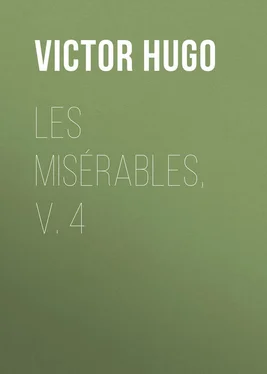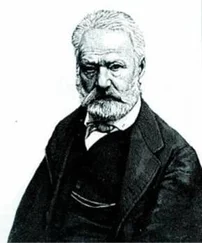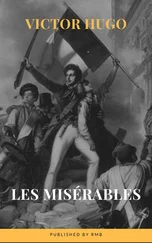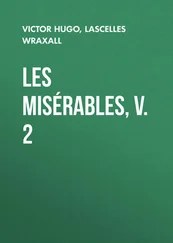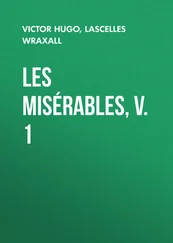Victor Hugo - Les Misérables, v. 4
Здесь есть возможность читать онлайн «Victor Hugo - Les Misérables, v. 4» — ознакомительный отрывок электронной книги совершенно бесплатно, а после прочтения отрывка купить полную версию. В некоторых случаях можно слушать аудио, скачать через торрент в формате fb2 и присутствует краткое содержание. Жанр: literature_19, foreign_antique, foreign_prose, на английском языке. Описание произведения, (предисловие) а так же отзывы посетителей доступны на портале библиотеки ЛибКат.
- Название:Les Misérables, v. 4
- Автор:
- Жанр:
- Год:неизвестен
- ISBN:нет данных
- Рейтинг книги:4 / 5. Голосов: 1
-
Избранное:Добавить в избранное
- Отзывы:
-
Ваша оценка:
- 80
- 1
- 2
- 3
- 4
- 5
Les Misérables, v. 4: краткое содержание, описание и аннотация
Предлагаем к чтению аннотацию, описание, краткое содержание или предисловие (зависит от того, что написал сам автор книги «Les Misérables, v. 4»). Если вы не нашли необходимую информацию о книге — напишите в комментариях, мы постараемся отыскать её.
Les Misérables, v. 4 — читать онлайн ознакомительный отрывок
Ниже представлен текст книги, разбитый по страницам. Система сохранения места последней прочитанной страницы, позволяет с удобством читать онлайн бесплатно книгу «Les Misérables, v. 4», без необходимости каждый раз заново искать на чём Вы остановились. Поставьте закладку, и сможете в любой момент перейти на страницу, на которой закончили чтение.
Интервал:
Закладка:
Other expressive facts were collected: thus a man went into a wine-shop, drank, and went away, saying, "Wine-dealer, the revolution will pay what is due." Revolutionary agents were nominated at a wine-shop opposite the Rue de Charonne, and the ballot was made in caps. Workmen assembled at a fencing-master's who gave lessons in the Rue de Cotte. There was a trophy of arms, made of wooden sabres, canes, cudgels, and foils. One day the buttons were removed from the foils, and a workman said, "We are five-and-twenty, but they do not reckon upon me, as they consider me a machine." This man was at a later date Quénisset. Things that were premeditated gradually assumed a strange notoriety; a woman who was sweeping her door said to another woman, "They have been making cartridges for a long time past." In the open streets proclamations addressed to the National Guards of the departments were read aloud, and one of them was signed, "Burtot, wine-dealer."
One day a man with a large beard and an Italian accent leaped on a bench at the door of a dram-shop in the Marché Lenoir, and began reading a singular document, which seemed to emanate from some occult power. Groups assembled around him and applauded, and the passages which most excited the mob were noted down at the time. "Our doctrines are impeded, our proclamations are torn down, our bill-posters watched and thrown into prison… The collapse in cottons has brought over to us a good many conservatives… The future of the people is being worked out in our obscure ranks… These are the terms laid down, action or reaction, revolution or counter-revolution, for in our age no one still believes in inertia or immobility. For the people, or against the people, that is the question, and there is no other… On the day when we no longer please you, break us, but till then aid us to progress." All this took place in broad daylight. Other facts, of even a more audacious nature, appeared suspicious to the people, owing to their very audacity. On April 4, 1832, a passer-by leaped on the bench at the corner of the Rue Sainte Marguerite, and shouted, "I am a Babouviste," but under Babœuf the people scented Gisquet. Among other things this man said: "Down with property! The opposition of the Left is cowardly and treacherous: when they wish to be in the right, they preach the revolution; they are democratic that they may not be defeated, and royalist so that they need not fight. The republicans are feathered beasts; distrust the republicans, citizen-workmen!" "Silence, citizen-spy!" a workman shouted, and this put an end to the speech.
Mysterious events occurred. At nightfall a workman met a "well-dressed" man near the canal, who said to him, "Where art thou going, citizen?" "Sir," the workman answered, "I have not the honor of knowing you" – "I know thee, though;" and the man added, "Fear nothing, I am the agent of the committee, and it is suspected that thou art not to be trusted. But thou knowest that there is an eye upon thee, if thou darest to reveal anything." Then he shook the workman's hand and went away, saying, "We shall meet again soon." The police, who were listening, overheard singular dialogues, not only in the wine-shops but in the streets. "Get yourself ready soon," said a weaver to a cabinet-maker. "Why so?" "There will be shots to fire." Two passers-by in rags exchanged the following peculiar remarks, which were big with an apparent Jacquerie: "Who governs us?" "It is Monsieur Philippe." "No, the bourgeoisie." It would be an error to suppose that we attach a bad sense to the word "Jacquerie;" the Jacques were the poor. Another time a man was heard saying to his companion, "We have a famous plan of attack." Of a private conversation between four men seated in a ditch near the Barrière du Trône only the following was picked up: "Everything possible will be done to prevent him walking about Paris any longer." "Who is the he ?" there is a menacing obscurity about it. The "principal chiefs," as they were called in the faubourg, kept aloof, but were supposed to assemble to arrange matters at a wine-shop near the Point St. Eustache. A man of the name of Aug, chief of the society for the relief of tailors, was supposed to act as central intermediary between the chiefs and the Faubourg St. Antoine. Still, a considerable amount of obscurity hangs over these chiefs, and no fact could weaken the singular pride in the answer made at a later date, by a prisoner brought before the Court of Peers.
"Who was your chief?"
"I did not know any, and I did not recognize any."
As yet they were but words, transparent but vague, at times mere rumors and hearsays, but other signs arrived ere long. A carpenter, engaged in the Rue de Rueilly in nailing up a fence round a block of ground on which a house was being built, found on the ground a piece of a torn letter, on which the following lines were still legible: "… The Committee must take measures to prevent recruiting in the sections for the different societies;" and as a postscript, "We have learned that there are guns at No. 5, Rue du Faubourg, Poissonnière, to the number of five or six thousand, at a gunmaker's in the yard. The Section possesses no arms." What startled the carpenter, and induced him to show the thing to his neighbors, was that a few paces farther on he found another paper, also torn, and even more significant, of which we reproduce the shape, owing to the historic interest of these strange documents.

Persons at that time on the scent of this discovery did not learn till a later date the meaning of the four capitals, — Quinturions, Centurions, Décurions , and Éclaireurs , or the sense of the letters u og a¹ fe , which were a date, and indicated "this 15th April, 1832." Under each capital letter were written names followed by very characteristic remarks. Thus, "Q. Bannerel, 8 guns, 83 cartridges. A safe man. – C. Boubière, 1 pistol, 40 cartridges. – D. Rollet, 1 foil, 1 pistol, 1 lb. gunpowder. – E. Tessin, 1 sabre, 1 cartouche-box. Punctual. – Terreur, 8 guns. Brave," etc. Lastly, this carpenter found in the same enclosure a third paper, on which was written in pencil, but very legibly, this enigmatical list.
Unité. Blanchard: Arbre sec. 6.
Barra. Sixteen. Sall au Comte.
Kosciusko. Aubry the butcher?
J. J. R.
Caius Graccus.
Right of revision. Dufond. Four.
Downfall of the Girondists. Derbac. Maubuée.
Washington. Pinson. 1 pist. 86 cart.
Marseillaise.
Sovereignty of the people. Michel. Quincampoix. Sabre.
Hoche.
Marceau. Plato. Arbre Sec.
Warsaw, Tilly, crier of the Populaire .
The honest citizen in whose hands this list remained learned its purport. It seems that the list was the complete nomenclature of the sections of the fourth arrondissement of the Society of the Rights of Man, with the names and addresses of the chiefs of sections. At the present day, when these obscure facts have become historic, they may be published. We may add that the foundation of the Society of the Rights of Man seems to have been posterior to the date on which this paper was found, and so it was possibly only a sketch. After propositions and words and written information, material facts began to pierce through. In the Rue Popincourt, at the shop of a broker, seven pieces of paper, all folded alike, were found in a drawer; these papers contained twenty-six squares of the same gray paper, folded in the shape of cartridges, and a card on which was written: —
Saltpetre… 12 oz.
Sulphur… 2 "
Charcoal… 2 1/2 "
Water...... 2 "
The report of the seizure showed that there was a strong smell of gunpowder in the drawer.
Читать дальшеИнтервал:
Закладка:
Похожие книги на «Les Misérables, v. 4»
Представляем Вашему вниманию похожие книги на «Les Misérables, v. 4» списком для выбора. Мы отобрали схожую по названию и смыслу литературу в надежде предоставить читателям больше вариантов отыскать новые, интересные, ещё непрочитанные произведения.
Обсуждение, отзывы о книге «Les Misérables, v. 4» и просто собственные мнения читателей. Оставьте ваши комментарии, напишите, что Вы думаете о произведении, его смысле или главных героях. Укажите что конкретно понравилось, а что нет, и почему Вы так считаете.
